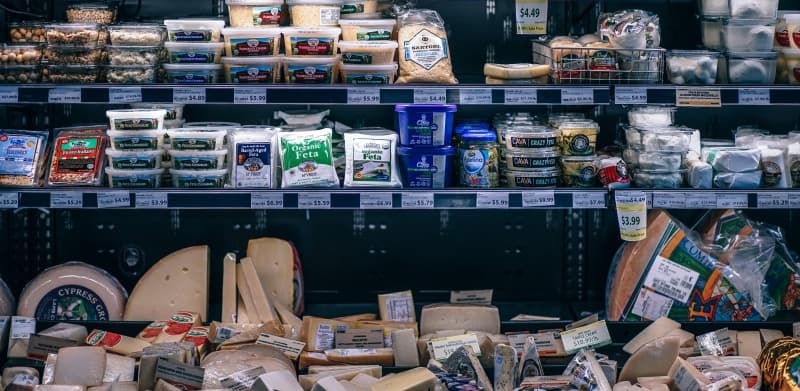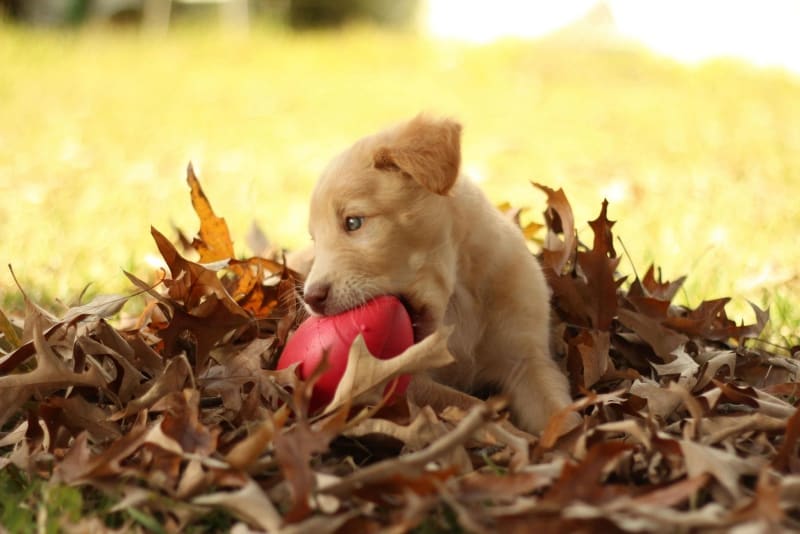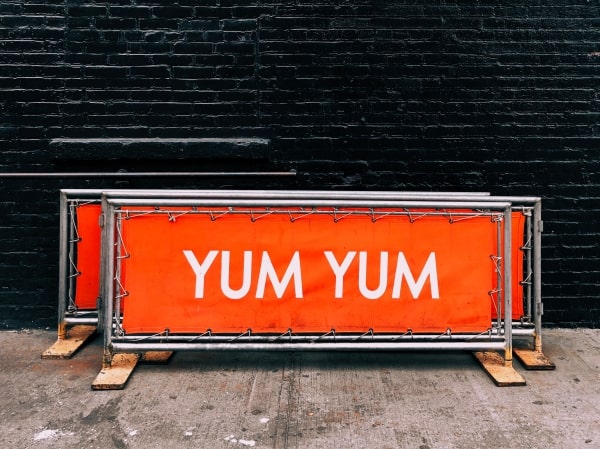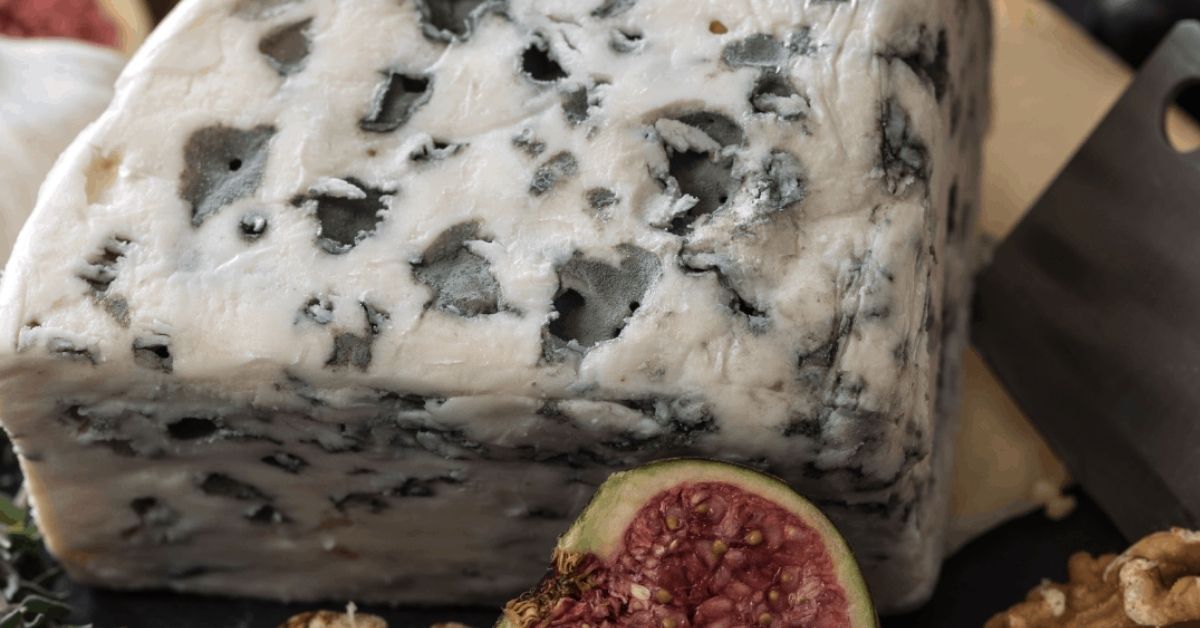Does your dog love cheese?
The answer is most likely YES! But do you know if all cheeses are safe for your furry friends?
But can dogs eat blue cheese?
And how much of a good thing is too much?
I’m going to answer these questions so you can safely share your love of this tasty treat with your pup.
Keep reading to learn what happens when a dog eats different types of cheese…
Is Blue Cheese Bad for Dogs?
Can dog eat blue cheese (stilton)? The most unsafe cheese for dogs to consume is blue cheeses such as stilton.
The fungus used to make these varieties produce a substance called roquefortine C, which dogs can be sensitive to.
This can cause vomiting, diarrhea, high temperatures and even seizures.
These risks increase the more they eat.
Call your vet if your dog has ingested any blue cheese.
Several cheeses have added ingredients that can cause your dog harm. Some being onion, garlic, raisins, macadamia nuts, grapes or avocado – all of which are toxic for your pup.
Some dogs are lactose intolerant, so eating small amounts of plain cheese, milk or dairy products can lead to diarrhea and/or vomiting.
This is no fun for your friend to go through, and no fun for you to clean up.

Is Cheese Poisonous to Dogs?
In general, cheese is not poisonous to dogs and is a safe and healthy treat when given in moderation.
Most dogs love all things dairy – from ice cream to yogurt to cheese.
This makes it an ideal option for a high-value reward when training your pet.
It’s also a great way to hide any medications he or she needs to take!

Even though dairy products are non-toxic to dogs, it’s an ingredient not necessary in their diet. Because of this, it should be given in moderation.
Some people claim cheese is bad for dogs because of its high fat content, but science does not back up that theory.
Dogs are not negatively affected by extra fat in their diet. In fact, they need fat and protein for energy.
Don’t Miss: Can Dogs Eat Limes?
Cheese can provide valuable nutrients to your dog, such as protein, calcium, essential fatty acids, vitamin B12, vitamin A, phosphorus and zinc.
So, it’s not all bad!
The main concern is with its high amounts of sodium and lactose content.
As mentioned above, some dogs are lactose intolerant.
While most cheese types are relatively low in lactose, signs of intolerance are visible with even small amounts.
Gastrointestinal distress is the most common sign of lactose intolerance in dogs.
Symptoms include abdominal pain, bloating, nausea, vomiting and diarrhea.
Cow’s milk has a different lactose content than other animal’s milk. While this might not be a good fit for your pup, goat cheese could cause no bad reaction.
Some types of cheese, such as cottage cheese are lighter and easier to digest, while cream cheese is richer and is harder for your dog’s tummy to handle.
It’s also important to note that dogs can develop allergies and intolerances later in life.
So you should always keep an eye out for a change in your dog’s behavior and pay attention to what they’re ingesting.
Another reason to give your dog cheese in moderation is its sodium content.
Giving high amounts of sodium to your dog can cause dehydration, dizziness and vomiting. It can also cause high blood pressure.
Check the nutritional facts and give your dog cheese that has as little of sodium as possible.
If your dog has been diagnosed with pancreatitis, you should never let him or her eat cheese. The fat content of this human food can put their pancreas under a lot of stress.

Also, if your dog is overweight and your veterinarian suggests they lose a few pounds, it’s best to avoid the extra fat content.
Pet obesity is a widespread issue, so getting your dog to a healthy weight is more important than offering a cheesy treat.
Can Puppies Eat Cheese?
As with older dogs, cheese is generally safe to offer as a treat to your young puppy.
Keep in mind that puppies can have a sensitive stomach, so it’s important not to stress them out with too much new food.
Exercise caution, introduce any new food to your young dog slowly, and watch for any changes.
If you notice any reactions, immediately remove the new food from their diet.

Can Dogs Have Feta Cheese?
Feta and mozzarella cheese have higher lactose content, although not enough to cause reactions in a healthy dog.
Not to say that dairy is toxic, it’s that dogs do not have the digestive enzymes necessary to process it the way humans do.
If you are unsure if your dog is lactose intolerance, you should check with your veterinarian.
They will recommend giving tiny amounts of dairy as a test to see if your pup experiences any side effects.
If there are no bad reactions, then your dog is usually in the clear to enjoy feta from time to time.
Can a Dog Eat Cheddar Cheese?
As long as your dog is not lactose intolerant, cheddar cheese is a good go-to treat!
Though hard cheeses tend to have salt as a preservative, cheddar contains a small amount.
What about other varieties of cheese?
Cottage cheese is one of the best options for adult dogs, thanks to high calcium content and low calories.
Swiss cheese and parmesan cheese are also a better option because of the low levels of lactose.
As mentioned before, it’s important to check the salt content and err on the side of caution.
If you you are purchasing it to use as a reward training treat for your dog, look for the lowest sodium amounts.
Varieties that aren’t the best to treat your dog to include cream cheese and Havarti.
The higher fat content of cream cheese is hard to digest. Also, they are normally flavored with ingredients that are unsafe for dogs, including garlic and onions.
Don’t Miss: Can Dogs Eat Tomato Sauce
My Dog Ate a Lot of Cheese – Now What?
The best option is to seek professional help and call your veterinarian.
Take note of your dog’s symptoms.
If your dog is experiencing diarrhea and vomiting, make sure to give them plenty of water to help with dehydration.
To help with an upset stomach, you can provide bland food the rest of the day. Offer rice with plain chicken or beef in small quantities instead of normal dog food.
If diarrhea does not go away by the third day, or if your dog is lethargic, you need to take your dog to your vet for an exam.
Remember, different cheeses can cause different reactions.
Eating large amounts of high fat cheese can lead to pancreatitis, which is a serious condition for your pet.
Blue cheese can cause high temperatures and even seizures.
Call your vet right away if you suspect your pup ate blue cheese or cheese flavored with toxic ingredients, like onions or garlic.

So, Can Dogs Have Cheese Everyday?
Yes dogs can have cheese everyday as an occasional treat but please avoid blue cheese!
Opt for a low or reduced fat variety, don’t overfeed, and introduce it slowly to make sure your dog doesn’t experience any bad reactions.
Then watch them savor in its deliciousness when you give them their daily treat!







